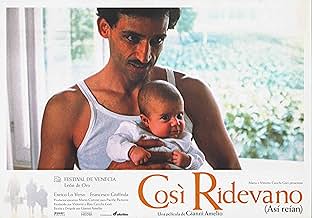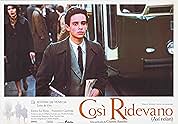Añade un argumento en tu idiomaTurin at the end of the fifties: two brothers have emigrated there from Sicily and the older works very hard to let the younger study and free himself from poverty through culture. The boy h... Leer todoTurin at the end of the fifties: two brothers have emigrated there from Sicily and the older works very hard to let the younger study and free himself from poverty through culture. The boy however is not keen on school and would like to begin to work. When after some time he gets... Leer todoTurin at the end of the fifties: two brothers have emigrated there from Sicily and the older works very hard to let the younger study and free himself from poverty through culture. The boy however is not keen on school and would like to begin to work. When after some time he gets his degree however things take a violent and dramatic turn......
- Premios
- 9 premios y 14 nominaciones
Argumento
¿Sabías que...?
- CuriosidadesThe title refers to the back page of a popular 1950s Italian magazine which had a section devoted to old jokes that were no longer funny but still evoked a sense of nostalgia. One such joke is repeated throughout the film: "How do you get four elephants in a Fiat?" The answer: "Two in front and two in back".
- ConexionesReferenced in Cannes Paradise (1999)
- Banda sonoraCucara cha cha cha
Written by Tony Vargas and Pepe Villa
Performed by Dámaso Pérez Prado
Courtesy of Peer International Corp./Edizioni Peersongs Italy Srl
Captioned the chapters by years and key words, the film infallibly circles around the two brothers, about their incompatible interrelation, which can be approximately summed up as follows, Giovanni unyieldingly insists that Pietro should finish his study and become a teacher, to fulfil a dream he is unable to pursue, as if this means the whole world to him, while Pietro, under such pressure to excel in the class, has to live in the fear that he might fail to live up to his dear brother's expectation, which establishes a deep discord between them. Life rarely goes according to one's wishful blueprint, however Amelio's meticulous endeavour, sometimes perilously close to mushy and over-indulgent, is to testify that blood is thicker than water, no matter what, even you have to murder a person, there is a silver lining awaits you.
Attentively restoring a retro setting of a period ripe with absolute poverty and blatant opportunism, Amelio opts for an alternative to green-light the success of the uneducated- but-determined money-grabber other than the younger-but-intellectual generation, eventually it is the latter's voluntary sacrifice saves the former from going down to the prison, so that the former can secure his hectoring business and start a genuine Italian family, with a sincere guilt compelling him to make up for the latter, but in the coda, after a heavy-handed device to sabotage a formal farewell ceremony, it leaves us wonder, how the two brothers have changed internally during the time-span, the same four-elephants-in-a- fiat joke caps the film, yet, they have become more distant from each other both physically and mentally.
Enrico Lo Verso, the leading actor of Amelio's more well-received works (THE STOLEN CHILDREN 1992 and LAMERICA 1994), greatly elicits Giovanni's devoted affection towards his beloved brother, addresses the most cringe-worthy dialogue (in Sicilian dialect, sounds like an utterly different language from Italian) with unaffected candour. Giuffrida, the young actor, was only 17 during the filming, is a few notches below by comparison, his Pietro is less sympathetic and his emotional spectrum is more intangible to pin down.
Many a time, the chapter-to-chapter cohesion fails to be fluent, viewers are prone to feel disconnected and confused about the happenings, for example, Giovanni's intentional tantrum in Pietro's school is introduced abruptly since Amelio coyly refuses to lay bare what has happened to Pietro, similarly, from his disappearance to a miraculous triumph aided by a private teacher, Pietro's transformation is bluntly conjured up without any weight. For what it's worth, THE WAY WE LAUGHED feels a tad undeserving of its garland, nostalgic, mawkish and a run-of-the-mill drama falls flat on its face.
- lasttimeisaw
- 30 sept 2015
- Enlace permanente
Selecciones populares
Detalles
Taquilla
- Recaudación en Estados Unidos y Canadá
- 57.009 US$
- Recaudación en todo el mundo
- 57.009 US$
Contribuir a esta página






















